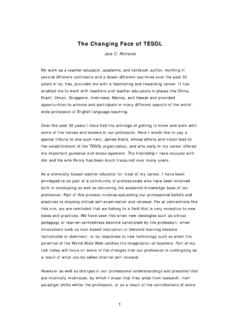Transcription of Globalization of Sport: An Inconvenient Truth1
1 1 Journal of sport Management, 2009, 23, 1-20 2009 Human Kinetics, is with the Dept. of sport Management, Brock University, St. Catharines, ON, Canada L2S earle f. zeigler lectureGlobalization of sport : An Inconvenient Truth1 Lucie ThibaultBrock UniversityThe purpose of the 2008 Earle F. Zeigler Lecture was to highlight some of the issues involved in the Globalization of sport that affect the field of sport management. In particular, four issues were presented: a division of labor undertaken on an international scale where transnational corporations are drawing on developing countries work forces to manufacture sportswear and sport equipment; the increasing flow of athletes where country of birth and origin are no longer a limitation on where an athlete plays and competes; the increased involvement of global media conglomerates in sport.
2 And the impact of sport on the environment. The impact and Inconvenient truths of these issues on sport management were addressed. When academics write about sports , they are capable of accomplishing the impossible: sucking all the pleasure and fun from the spectacle (Foer, 2006, p. 86). I begin with this quotation because I believe that, that is, in part, what I am about to do in this paper. I chose to discuss the Globalization of sport for the Earle F. Zeigler Lecture for a number of reasons.
3 First, although the topic has been addressed by our colleagues in sport sociology (cf. Andrew & Grainger, 2007; Bairner, 2005; Hargreaves, 2002; Harvey, Rail, & Thibault, 1996; Maguire, 1999, 2005), it has not been extensively studied by sport management and sport policy scholars. Some exceptions include the work of Allison (2005), Henry and [the] Institute of sport and Leisure Policy (2007), Houlihan (1994, 1999), Mason (2002), Mason and Duquette (2005), Means and Nauright (2007), and Wheeler and Nauright (2006).
4 As well, a number of textbooks and chapters aimed at sport management students on the importance of Globalization in sport management have been published (cf. Fay & Snyder, 2007; Gratton & Leberman, 2006; Thoma & Chalip, 1996; Westerbeek & Smith, 2003). These works have all addressed issues of global governance and the marketplace in an era of global prominence. Second, it is clear that a number of controversial issues affecting professional and amateur sports are global for example, the use of performance enhancing drugs, the migration of athletes and coaches, the environmental impact, the use of developing countries workforce for the production of sportswear and sport 2 Thibaultequipment, and the general commodification and commercialization of sports in society.
5 Third, there are a number of sport organizations that yield a great deal of power in the world. Organizations such as the F d ration Internationale de Football Association (FIFA), the International Olympic Committee (IOC), and the National Basketball Association (NBA) play an important role in the new sport world order. Finally, it is increasingly imperative for sport management students to understand Globalization and its impact on sport as they embark on careers in the Globalization has led to positive outcomes in sport management, it also presents important drawbacks that must be understood and respected.
6 At the very least, sport management students should be sensitized to issues of multilingualism, multiculturalism, and multidisciplinarity in the delivery of sport in a global context. Before addressing these issues, it is important to define Globalization . For the purposes of this paper, I have relied on Robertson s (1992) interpretation of Globalization , that is, the consolidation of the world into a whole space in other words, a global community (p. 9). Robertson (1992) further explains that Globalization is the compression of the world and the intensification of consciousness of the world as a whole (p.)
7 8).In the numerous works on Globalization , several factors have been identified as playing a key role in the increasing movement toward Globalization (cf. Marchak, 1991; Robertson & White, 2007; Teeple, 2000; Thomas, 2007; Wolf, 2004). These factors include: pressures from transnational corporations, international capital, neoliberal economies, and right-wing governments where markets have become deregulated and trade relations among countries have increased (Marchak, 1991; Teeple, 2000; Thomas, 2007; Wolf, 2004).
8 In addition, progress in communication technologies has enhanced the ability of exchange among individuals, organizations, and governments. All this, in turn, has contributed to Globalization in the political, economic, social, and cultural spheres (Neverdeen Pieterse, 1994; Robertson & White, 2007). The focus of these spheres has been addressed in various contexts: politics and international governance, economics, business, media and technology, health, education, development, environment, and culture, to name a few (cf.)
9 Ritzer, 2007). Sport has not been excluded from these discussions of the application of the political, economic, social, and cultural spheres (cf. Andrews & Grainger, 2007; Giulianotti & Robertson, 2007a, 2007b; Harvey & Houle, 1994; Harvey et al., 1996; Taylor, 1988; Wright, 1999).In the context of sport , Tomlinson and Young (2006) and others (cf. Wertheim, 2004; Westerbeek & Smith, 2003) remind us that the FIFA is more global than the United Nations (UN) since the FIFA has a membership of 208 countries while the UN s membership is 192 countries (cf.
10 FIFA, 2008; UN, 2008).2 Along similar lines, the IOC is also larger in scope than the United Nations. Giulianotti and Robertson (2007a, 2007b) note that Olympism has a global political reach, with 203 National Olympic Committees affiliated to the IOC, giving 11 more national members than the United Nations (p. 108).3 Tomlinson and Young (2006) write in participatory terms, the World Cup and the Olympics offer a platform to all nations, and most of all to small nations of the world, that is unrivaled by any other cultural or political body, even the United Nations (p.





